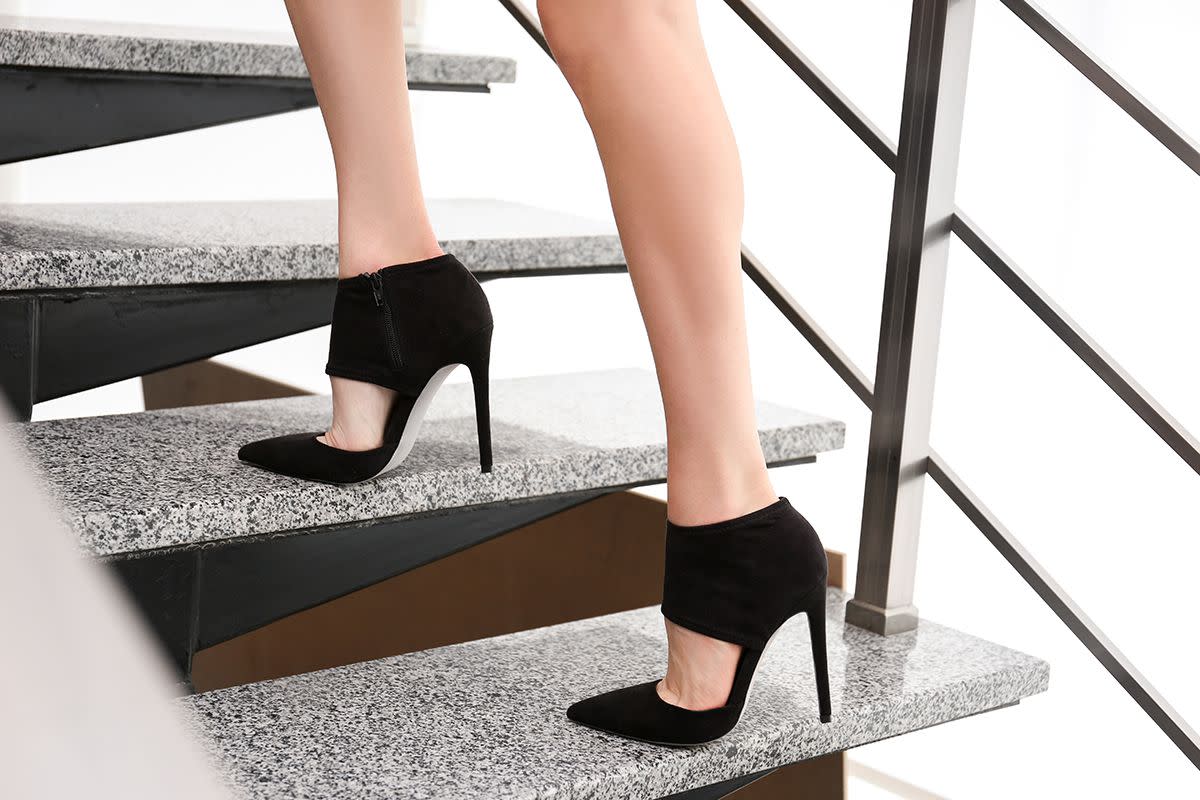Reasons Why You Feel Winded When You Walk Up the Stairs

Photo: Shutterstock
For people who make an effort to work out regularly, it can be frustrating and confusing when everyday activities prove to be physically challenging. Case in point: You hit the gym on the reg, but when you take the stairs at work, you're totally winded. If you're putting in a ton of effort at the gym, why does something so commonplace feel so difficult?
First things first, you should know that feeling out of breath when you reach the top of the stairs isn't some scary warning sign about your health. "If you're in shape but feel short of breath bolting up a few flights of stairs, don't worry!" notes Jennifer Haythe, M.D., a cardiologist and co-director of the Women's Heart Center at Columbia University's department of medicine. "You're not alone. Going up stairs is a burst (of) activity and uses many muscles in your body. Your body needs a sudden increase in oxygen, so heavy breathing is normal," she explains. Phew.
Now that's out of the way, here are some of the reasons stairs can be so tough even if you're fit, plus how you can make that winded feeling go away. (If you're dealing with more constant chest tightness, here's what could be going on.)
You don't warm up before taking the stairs.
Think about it. When you work out, it usually takes a few minutes to get things going, right? "A normal 60-minute cardio class, by design, includes a 7- to 10-minute warm-up that gradually increases your heart rate and blood flow, which prepares you for the upcoming cardiovascular challenge," explains Jennifer Novak, C.S.C.S., a performance recovery coach and founder of PEAK Symmetry Performance Strategies. When you bound up the stairs, you're not doing any prep work to get warmed up beforehand. Instead of gradually increasing your heart rate and oxygen needs, you're doing it all at once, which is more of a challenge for your body.
Related: 5 Ways to Get a Crazy Good Stair-Climber Workout
Stairs use many muscle groups.
"My runners are always asking me why they can run a marathon but going up one flight of stairs leaves them out of breath," says Meghan Kennihan, a NASM-certified personal trainer and USATF run coach. Simply put, it's because going up stairs demands a lot of your muscles. "Climbing a flight of stairs uses more muscles than walking," explains Kennihan. "You are basically doing lunges uphill and fighting against gravity. If you're already working out hard to train for a strenuous event like a triathlon or a marathon, then getting up a flight of stairs is just contributing to your heavy workload, so your legs and lungs are going to let you know," she notes. (Anyone else going to call it "doing uphill lunges" instead of "going upstairs" now?)
Stairs require a different type of energy.
Stair climbing also uses a different energy system than regular old cardio, which can make it feel a whole lot tougher, says Novak. "The phosphagen energy system is what the body uses for quick bursts of power and for short bouts lasting less than 30 seconds. The molecules used for providing the energy for this type of exercise (called creatine phosphate) are in small supply," she explains. That means you have less energy for quick bursts than you do for steady-state cardio work, so the fact that you get tired faster isn't all that surprising when you consider where the energy is coming from. (If you want to train stairs specifically, try these stair-climber exercises from Blogilates creator Cassey Ho.)
Related: You Should Be Doing These Three Types of Cardio
Here's a better measure of fitness.
The bottom line? You'll probably always get at least a little tired going up the stairs in your everyday life, and it doesn't mean anything significant about how fit you are or aren't. What's more meaningful, experts say, is how long it takes you to recover. The fitter you are, the less time it will take for your body to return to its normal state after exerting energy. "As you build both heart muscle and skeletal muscle by working out, you'll notice your heart rate recovery time shortens," says Kennihan. "Your heart becomes more efficient and your muscles get a larger supply of oxygenated blood with each contraction, so your heart doesn't need to work as hard. As you increase the time and amount you work out, it translates to a healthier heart when you're not working out," she adds.

